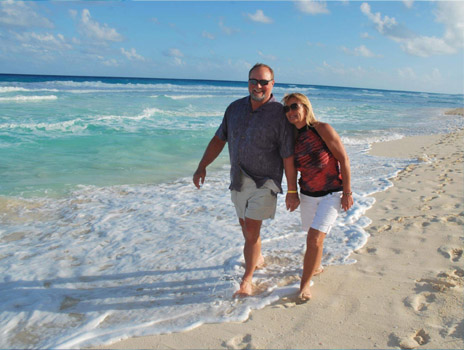- Home
- News Room
- Patient Stories Search Page
- Multiple Myeloma Patient Treated with CAR T-cell Therapy
June 08, 2021
Bill Coppinger didn’t want to make history. He just wanted to play with his grandchildren. But becoming the world’s first person to receive Abecma®, a new treatment for multiple myeloma, makes Bill both historic and a happy grandfather.
Diagnosed with multiple myeloma 7 years ago at age 59, Bill’s first chemotherapy treatment was scheduled for his 60th birthday. He and his wife, Sheryl, asked the doctors to postpone the treatment for a couple of days. “Bill’s care team at The University of Kansas Cancer Center said, ‘Nope, we get this birthday. You can have the next ones,’” Sheryl recalls. “I’ve never forgotten that.”
Multiple myeloma is a type of blood cancer affecting about 30,000 people each year. Bill’s initial treatments resulted in remission, but the cancer returned which is the norm for a multiple myeloma cancer diagnosis. Bill then had a stem cell transplant at The University of Kansas Cancer Center. Following the transplant, he took medications to continue treating the disease and required weekly chemotherapy to keep the disease in check.
World’s first to receive Abecma
“I was running out of options,” says Bill, who lives in Winchester, Kansas, northwest of Kansas City. “I didn’t qualify to be part of the patient (clinical) trials for Abecma, but I’m very grateful to the people who did participate in those trials – they made this day possible.”
The day he is referring to was May 12, 2021, when Bill became the first person in the world treated with Abecma. The drug is a type of CAR T-cell (chimeric antigen receptor T-cell) therapy, a form of immunotherapy that trains the immune system to target and destroy cancer cells while sparing healthy cells.
The University of Kansas Cancer Center is the first and only in the region to offer this FDA-approved CAR T-cell therapy for relapsed/refractory (unresponsive to treatment) multiple myeloma and again the first in the world to actually perform the treatment commercially. Abecma is 1 of 5 FDA-approved CAR T-cell therapies offered at the cancer center and the first one specifically for use in multiple myeloma patients.
Hematologist/oncologist Al-Ola Abdallah, MD, is one of the physicians on Bill’s care team. “We provide comprehensive care for our myeloma patients,” he says. “Offering newer drugs and lines of therapy as well as clinical trials is how we do that. It’s truly customized care for the patient.”
CAR T-cell therapy trains T-cells to attack
T-cells are a natural part of the immune system, but cancer cells can evade them, Dr. Abdullah explains. CAR T therapy redirects the T-cells so cancer cells can no longer hide from them. Scientists are developing a variety of CAR T therapies to treat different types of cancer. “It’s too early to call this a cure,” Dr. Abdullah notes, “but it’s a great start. In the 1990s, the survival rate for multiple myeloma was 2 to 3 years. Now we’re looking at 10 to 15 years or more with CAR T immunotherapy.”
The treatment involves taking blood and separating out the T-cells. The cells are then sent to a lab and genetically altered to produce special receptors, chimeric antigen receptors (CARs), that will detect malignant cells. The CAR T-cells are infused back into the bloodstream where they begin seeking and destroying the cancerous cells.
Although CAR T therapy is not a first-line treatment and is only used when other treatments are ineffective, it has the potential to free people like Bill from ongoing weekly chemotherapy treatments. “There are fewer office visits and no worries about missing weekly treatments,” Dr. Abdullah says. “Abecma offers a longer duration of response.”
Abecma offers hope
For Bill, that means hope for the future and more time with his 10 grandchildren. “We live on a farm, so there’s plenty to do, plus being able to travel again to spend time with my family. We’re pretty excited about it,” he says.
Sheryl seconds Bill’s enthusiasm. “We’ve been very worried about Bill, and the fact that the doctors here got us rolling on this so quickly is a relief. We’re so happy to be at this point now. We have some freedom and a chance for him to get some strength back. We’re very thankful.”
While receiving treatment at the cancer center in May, the Coppingers missed their granddaughter’s graduation. But they now look forward to other milestones. “Bill wants to be here to dance with her when she gets married someday,” Sheryl says. “And this gives us hope and confidence for the future.”
Find a clinical trial.
Clinical trials give you an opportunity to try new therapies that might not otherwise be available. Search our clinical trials.
As with all treatments, individual patient results vary. It is important to discuss your treatment options with your healthcare provider.
